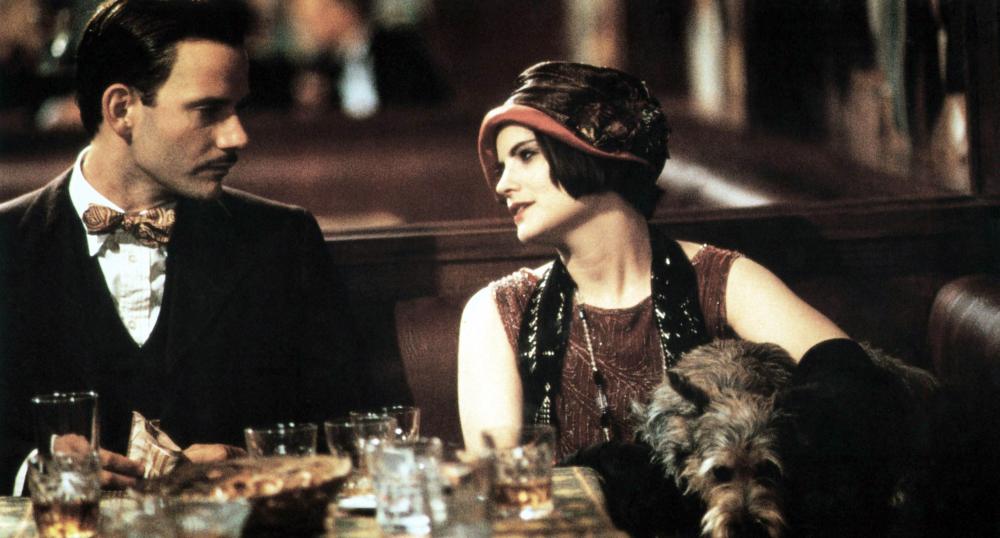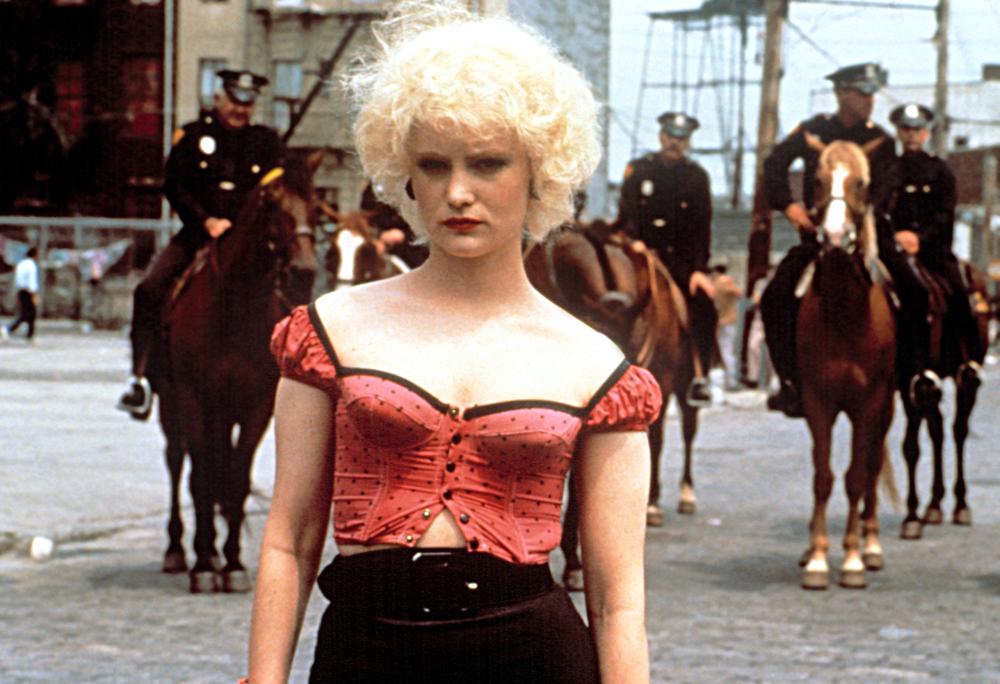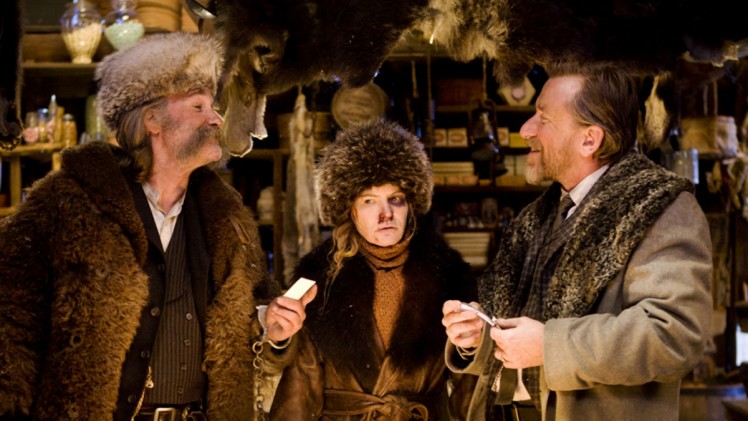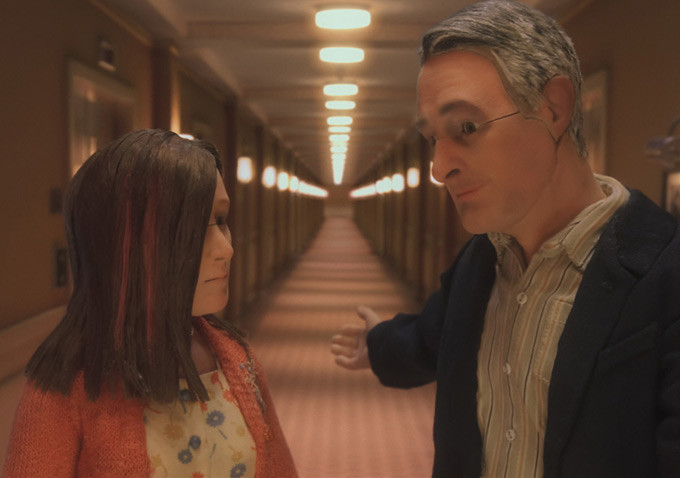5. Georgia (1995)

Georgia is Leigh’s most personal movie to date – the screenplay was written by her mother, Barbara Turner – and it’s easy to see why within the first five minutes. Despite naming the film after her older sister, Leigh’s character Sadie is a train wreck of a human being, one who dominates every inch of celluloid throughout Georgia’s entire running time.
Like Margot at the Wedding, the story of Georgia revolves around a fractious relationship between two sisters, but Leigh is far less composed here, lashing out at everyone around her in a desperate bid for even the tiniest scrap of attention. Sadie’s “bad girl” persona is more befitting of a rock star, yet Georgia is the one who finds success in the music industry, driving a wedge between the two that Sadie can only alleviate temporarily through the use of drugs and alcohol.
Sadie’s nervous energy is palpable on screen and at times, Leigh imbues the character with a desperation that’s almost too uncomfortable to watch, culminating in an astonishing rendition of Van Morrison’s “Take Me Back” on stage. Vocally, Leigh isn’t at the same level as her co-star Mare Winningham, but that’s the point, and ultimately, Sadie’s self destructive path is far more fascinating to watch.
In a rare case of life imitating art, Georgia’s critical success led to an Oscar nomination for Winningham, while Leigh was completely overlooked by the Academy, despite many assuming she would be guaranteed consideration. At the actual ceremony, Meryl Streep even walked around backstage, infamously declaring that “Jennifer should be here!”
Meryl can literally do no wrong.
4. Mrs Parker and the Vicious Circle (1994)

In one of her most ambitious roles to date, Leigh took on the literary icon Dorothy Parker in Alan Rudolph’s biography Mrs Parker and the Vicious Circle. Many actors shy away from playing real life characters, striking a careful balance between homage and a direct impersonation is never easy, but Leigh boldly tackled the witty author with admirable dedication in what eventually became one of her most memorable roles to date.
Never one to shy away from hard work and preparation, Leigh studied recordings of the authors uniquely cynical accent to nail her voice, but that’s not all she brought to the role. Underneath the sharp witticisms and scathing satire, Parker’s writing masks a raw vulnerability that Leigh encapsulates perfectly, gradually allowing the cracks in Parker’s armour to seep through her tough as nails bravado. It’s hard to imagine anyone else delivering lines such as “I never liked a man I didn’t meet”, as sharply as Leigh.
Unlike the majority of other performances on this list, Leigh’s depiction of Parker earned her some award recognition in the form of a Golden Globe nomination. Predictably though, Leigh lost out to Jessica Lange for her part In Blue Sky, but at least the oft-overlooked star nailed an astoundingly demanding and powerful role.
3. Last Exit To Brooklyn (1989)

Leigh has enjoyed an extremely varied career, playing everything from motormouth reporters to wanted felons, but critics striving to pigeon-hole the actress into one category often refer to a couple of her earlier roles as prostitutes. While Miami Blues received mixed reviews, representing a rare foray into mainstream filmmaking for Leigh, her performance in Last Exit To Brooklyn is the moment when people sat up and truly took notice of the rising star.
As the obvious standout in this darkly powerful ensemble piece, Leigh’s character Tralala explodes off the screen, dominating every scene with a fiercely raw sexuality that monopolises the viewers attention throughout.
It would be easy to stereotype a character like Tralala in the vein of Hollywood characters such as Vivian from Pretty Woman, but Leigh transcends this archetype, bringing her signature combination of strength and vulnerability to the role. Leigh herself argues that characters like these may be vulnerable, but “none of the women I’ve played are absolute victims. They have their own power.”
Nowhere is this more evident than in the final scene of Last Exit To Brooklyn. In a desperate attempt to reassert her own identity, Leigh’s character Tralala drunkenly flirts with a number of soldiers in a bar, which ends tragically with a horrendous gang rape.
A young teenage boy who has been infatuated with Tralala discovers her battered body after most of the other men have left. Devastated by what he sees, the boy collapses into sorrow, but instead of conceding to his pain, Tralala is compelled to comfort him, despite the awful things that have just happened to her. Few actresses could imbue such a horrific scene with the raw, naked humanity that Leigh evokes in Tralala.
2. The Hateful Eight (2015)

When Quentin Tarantino’s Pulp Fiction won the coveted Palme d’Or at Cannes, only two other American movies were regarded in the competition and both just so happened to star a rising actress by the name of Jennifer Jason Leigh. Tarantino bested both The Hudsucker Proxy and Mrs Parker and the Vicious Circle that day, but he never forgot Leigh, helping to revitalise her career over twenty years later in a similar fashion to John Travolta’s comeback in Pulp Fiction.
Taking on the role of Daisy Domergue in The Hateful Eight must have been a daunting task; the woman is a racist, immoral member of a violent gang who spends the majority of the films running time handcuffed to Kurt Russell’s hardened bounty hunter. Every time Leigh’s character speaks up, whether it’s to antagonise her captor or shoot venomous barbs at Samuel L. Jackson, Daisy receives a violent punch to the face, breaking her nose in the process.
As always, Leigh rose to the challenge, crafting a despicably mesmerising character whose ferocity steals the show in one of Tarantino’s most talented ensembles to date. Whether she’s cackling as blood pours down her face or playing a tender song on the guitar to distract the others, Daisy is an instantly iconic creation, deservedly earning Leigh her first Oscar nomination.
Leigh herself recognises how important The Hateful Eight is, describing it as “probably the best movie of my career”, so what role could have possibly taken the top spot?
1. Anomalisa (2015)

The part of Daisy Domergue was one of the most physically challenging of Leigh’s career, exploring a character damaged beyond redemption, but in the same year that The Hateful Eight was released, Leigh’s work in the Charlie Kaufman animation Anomalisa finally hit the big screen too… and both roles couldn’t have been more different.
Kaufman wrote the script for Anomalisa over a decade ago and always had Leigh in mind for the role of Lisa. After she and Thewlis both performed the story as a play back in 2005, the project lay dormant for a number of years, before Kaufman finally revived it in the form we know now.
Few would have predicted that a stop-motion film featuring puppets could have found success outside of Team America style comedy, but Anomalisa is a landmark piece of cinema that has revolutionised the way animation is perceived. Ultimately though, the entire premise of the film hinges on the two lead performances. Without the involvement of Leigh and David Thewlis, the project could have easily fallen apart.
It’s impossible to imagine Lisa being played by anyone else. Leigh may not be physically present in the movie, but the intense optimism and fragile self worth of Lisa’s character is wholly intertwined with Leigh’s stunning vocal performance, one that deserves an Oscar nomination even more than her part in The Hateful Eight.
While Daisy Domergue is a violent mess of pain and cruelty, the titular character of Anomalisa is utterly vulnerable, bearing her naked anguish openly for the world to see in every awkward word and gesture she makes. The brief romance Lisa develops with an older, British man named Michael is one of the most painfully brutal, yet honest relationships ever committed to film, which makes Anomalisa’s unusual aesthetic even more shocking to behold.
There may not be a single human featured in Anomalisa, but the humanity that Leigh brings to the role is simultaneously heartbreaking and uplifting in a way that few performances are. Daisy Domergue may be the part that Leigh will always be remembered for most, but her role as Lisa is the one that holds the power to truly inspire audiences, teaching us more about the human condition than a thousand ever could.
Author Bio: David is a primary school teacher who tries his best to turn every math lesson into a discussion on the latest Pixar film. In his spare time, David writes freelance articles for a number of sites, covering everything from superheroes and zombies to Studio Ghibli and Xavier Dolan movies. To read more of his work, follow David here on Twitter.